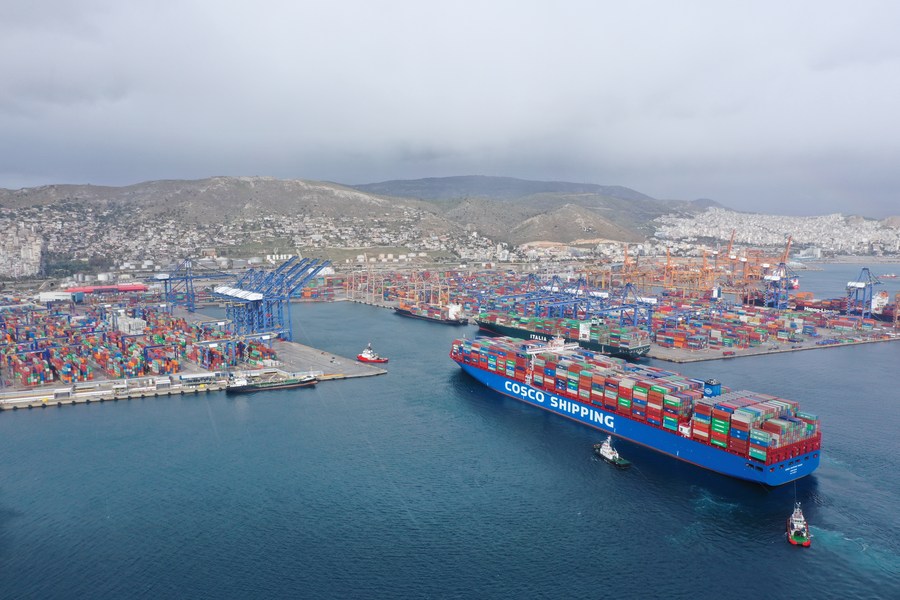Greece-China cooperation to become a highway

Aerial photo taken on Feb 15, 2019 shows the COSCO Shipping Pisces approaching Piraeus port, Greece. [Photo/Xinhua]
The 50th anniversary of the establishment of diplomatic relations between Greece and China coincides with an increased tempo in the cooperation between the two countries.
Apart from their economic cooperation, another recent prominent example is the joint study program "Greek and Chinese Civilizations: A comparative approach", which Greece's University of Patras in the Peloponnese and China's Southwest University in Chongqing are launching in 2022-23.
The relations between the two peoples are not new. They are deep rooted in common respect for each other's cultural heritage and mutual recognition of the historical course of each country. Above all, our peoples are the modern representatives of two ancient civilizations: Greece, the birthplace of Western civilization, and China, the birthplace of Eastern civilization.
Apart from historical and cultural ties, Greece and China have developed close economic cooperation over the years, especially after 2006, when they signed their Integrated Strategic Partnership agreement, which upgraded bilateral relations from the level of constructive engagement to a strategic partnership. This has proved to be a mutually beneficial situation. On the one hand, the agreement has facilitated Chinese investments in Greece, which have turned out to be remarkably profitable, and on the other hand, the Greek economy has benefited in many ways.
The flagship project in Greek-Chinese cooperation is undoubtedly investment by China Ocean Shipping Co, or COSCO, in the Port of Piraeus. When others assumed a "wait and see" policy, it was COSCO that trusted the value of the port, a strategically located Mediterranean port that links Europe, the Middle East and North Africa.
The results are remarkable and exceed the most optimistic forecasts. As of 2021, COSCO had invested more than 1 billion euros ($1.07 billion) resulting in 3,000 direct jobs and more than 10,000 jobs in related services. The Port of Piraeus is now the leading port in the Mediterranean in terms of container transportation, and is the fifth in the European Union and the 29th worldwide. Of course, Greece welcomes COSCO's aim to reach a container throughput of 10 million TEUs, or twenty-foot equivalent units-almost double its current performance, which would make Piraeus the largest and most efficient logistics hub in Central and Eastern Europe.
Another example of fruitful bilateral cooperation is ADMIE(IPTO), Greece's power grid operator. China's State Grid Corp is a strategic investor in ADMIE, with a 24 percent stake, and has an active interest in acquiring up to 20 percent of the shares in Ariadne Interconnection, the IPTO special-purpose vehicle that implements the Crete-Attica interconnection project.
Shipping is of course the jewel in the crown in bilateral economic relations, as Greek ships, many of which were built in Chinese shipyards, carry Chinese products worldwide, contributing to the flourishing of international trade in recent decades.
Banking is another promising sector within the framework of bilateral cooperation. Bank of China has established a branch in Athens, the first branch of a Chinese bank in Greece, aiming to support Greek companies' development in the Chinese market and to help Chinese companies invest in Greece.
There is no doubt that during the COVID-19 pandemic crisis, the momentum of cooperation has unavoidably been affected. However, despite the strong headwinds that the global economy is facing, such as the sharp increase in commodity prices, supply chain bottlenecks and uncertainty due to the Russia-Ukraine conflict, I strongly believe that bilateral cooperation can regain momentum, and deepen and expand into new areas.
In this volatile international environment, Greece shines as a beacon of stability, highlighting significant advantages for would-be investors: a supportive macro and political environment, a purely pro-business government, Greece's euro area membership and strategic alliances, the increasing geopolitical value of the region, the combined amounts of both the EU Recovery and Resilience Facility and structural funds, and the bold, ongoing program of public-private partnerships and privatization.
The Greek economy offers unique opportunities for high return on investments in many fields such as infrastructure, tourism, real estate, renewable energy, agri-food, information technology and logistics. Furthermore, Chinese investors can picture Greece in the broader economic framework as the point of entry to the Central and Eastern European countries, a significant regional market.
Therefore, as the coordinator of the Greek government in the Sino-Greek committee for the further development of the bilateral relationship, I can assure everyone that our administration is very keen to welcome more Chinese investments in Greece. We have high expectations for the future of our relations, and we aim to address our economic cooperation as a road that can become a highway.
The author is Greek minister of development and investments.


